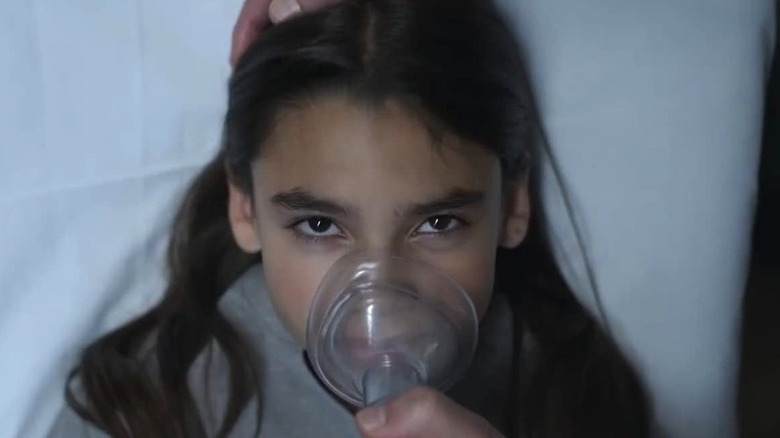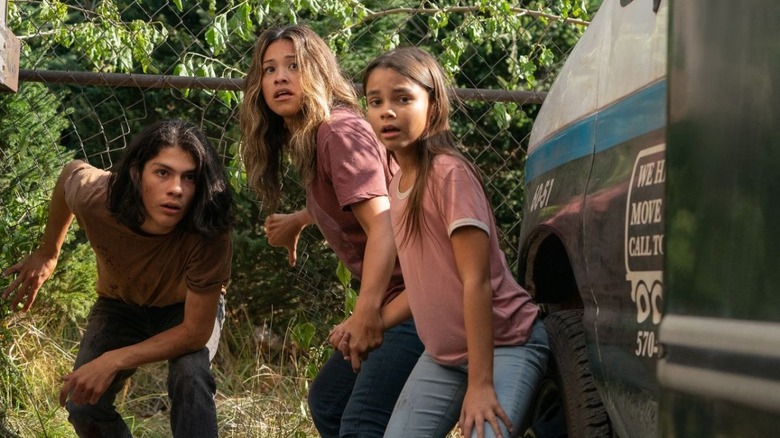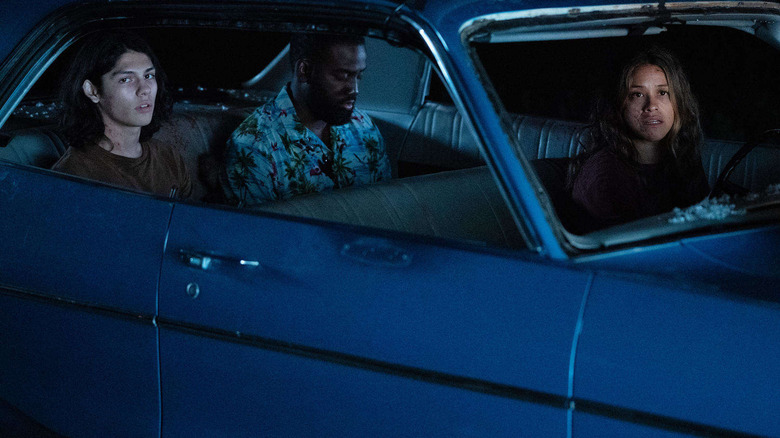Awake Review: Tell Me I'm Dreaming
High-concept apocalyptic thrillers are all the rage in Hollywood right now. But for every "A Quiet Place" or "Bird Box" that becomes an unexpected cultural phenomenon, there's a movie like 2019's "The Silence," which fails to deliver the adequate amount of scares required to make the audience overlook just the many plot holes in its world-building. "A Quiet Place" still remains the gold standard for the modern apocalyptic horror, but more for the way it navigates around its flaws than the quality of the film itself, doing its best to distract the audience from gaping narrative inconsistencies with some genuinely effective set pieces. Whether it's aliens who attack anything that makes a sound, or invaders who cause anybody who looks at them to die on the spot, each of these high-concept horrors is inherently silly — and yet none of them is quite as ridiculous as the latest film in this unexpectedly popular subgenre.
"Awake" is a post-apocalyptic thriller set in a world devastated by an unexpected supernatural event that has stopped mankind from being able to fall asleep. But rather than a slow descent into chaos from the tired masses, a single night without sleep or access to electronics (which, equally without explanation, have also all stopped working) has caused civilization to plummet back to a primal state of being. This is far from the only leap of logic that makes "Awake" such a consistently bizarre, not to mention unintentionally hilarious, viewing experience. After so many recent horror movies depicting society torn apart in sense-altering ways, this latest entry to the canon (streaming on Netflix globally from June 9) can't help but feel like an overblown parody of a genre that was already ridiculous to begin with.
An unbelievable apocalypse
Jill Adams (Gina Rodriguez) works for the military by day, and as a drug dealer by night. She has a frosty relationship with her children Noah (Lucius Hoyos) and Matilda (Ariana Greenblatt), but their lives are irreversibly changed when the three of them end up in a car crash. Jill's car is thrust into the river, and she has to get her children out and swim to safety. After Matilda is saved from drowning, they discover that strange things are happening when they climb back on shore; there have been power outages seemingly across the entire world, with everything from smartphones to vehicles now refusing to work. But it's that evening when things start getting strange — people can't get to sleep, and after thousands initially party through the night (candlelit street parties with nothing but live drumming, as the power doesn't work), this soon turns into widespread chaos as the sun rises and a new day begins.
All because of a single night without sleep, many people have turned to rioting: buildings are destroyed and dead bodies are lining the streets. But as the world adjusts badly to a life constantly awake, further chaos is set to ensue as it's discovered that Matilda inexplicably slept peacefully through the night. Held up as a new religious deity because of her power, Jill now is tasked with safely transporting her to a military hub where tests can be run on her to see why she is immune from the events happening all around her. Without her, humanity may never sleep again — and as people's brains grow ever more frazzled from exhaustion, the clock is ticking to find a cure before nobody can function any longer.
While watching "Awake," I remembered a long-forgotten early 2000's British reality series called "Shattered," in which contestants had to try stay awake for a whole week to win a £100,000 cash prize. The series was initially designed to be a more high-concept cousin to "Big Brother," but it turned out there was only so much mileage the producers could get from making a group of tired people try to stay awake, especially as the series continued and their sleep deprivation made for less-than-entertaining viewing. "Awake" feels like we immediately transition to the fourth consecutive sleepless night due to how much society has unraveled into full hysteria, so eager to show mental states collapsing it doesn't linger on the building of this world or how its characters adapt to it. There have been high-profile experiments to unpack the full effects of longterm sleep deprivation before, but screenwriters Mark and Joseph Raso aren't particularly interested in realism. Instead of creating a growing unease that would lead to a believable depiction of hysteria, their screenplay immediately jumps forward to widespread lunacy, and it can't help but make the entire story feel ridiculous as a result.
Mark Raso also serves as director for "Awake." Previously best known for "Kodachrome," the now-forgotten 2017 road movie starring Ed Helms, Elizabeth Olsen, and Jason Sudeikis, he adapts better to the horror genre than you'd expect from someone whose two other feature credits are offbeat comedy dramas. The early car crash sequence, in which the family are submerged in water and fighting to escape in what appears to be one unbroken take, is effective for the very reason much of the film isn't — it believably builds tension, rather than rushing towards the most convoluted conflict imaginable. When telling a story with a high concept, the stakes have to still remain tangible; following this well-executed set piece, "Awake" spins off the rails so quickly, it can feel like it only exists so people will watch to laugh along with their friends and point out all the gaping plot holes.
Beware: spoilers ahead
Of course, it should be noted that plot holes are only ever a problem if the central drama isn't engaging enough to distract you from the leaps in logic. "Awake" is, if anything, paced too frenetically, leaping from one far-fetched scenario to another at a breakneck speed, seemingly chosen so the audience doesn't linger on the numerous details in this world that don't make sense. This means that plot beats that seem crucial (such as Matilda being held up as a deity after visiting a church) are irrelevant the second the narrative forces the characters into another setting. And this approach to storytelling goes beyond the obvious narrative contrivances, although I'm sure many will still roll their eyes at many of these details; few are more distracting than how power has stopped all vehicles from working, apart from older cars — the ones necessary to drive the characters to the military base for the film's final act.
That aforementioned third act takes place entirely in a military-operated medical facility, where Matilda has been taken to have tests run on her. Here we not only discover that chimpanzees are the only other creatures effected by the lack of sleep, as they have the DNA closest to humans, but that an elderly person who was diagnosed with a terminal condition months before has managed to not only survive, but sleep. And here, we finally discover why Matilda has survived: by nearly drowning at the start, she had the near-death experience necessary to be able to keep living as normal. Teenage son Noah is now able to sleep after being shot by a soldier who is losing his mind, and the film ends with the two children leading Gina Rodriguez underwater, in an attempt to drown her so she can be brought back to life. It's an ending you suspect the writers would call bittersweet, when it is actually just pure lunacy.
"A Quiet Place" and "Bird Box" may have stretched narrative credibility to breaking point, but neither apocalyptic thriller was quite as silly as "Awake." Undeniably one of the year's most ridiculous films, its depiction of a world going mad without sleep offers outlandish developments at such a fast pace, you'll be as tired as the characters by the time you get to the finale.


